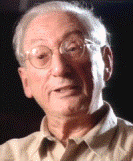Skip to: site menu | section menu | main content
Welcome To Democracy And Socialism .Com
Things should be made as simple as possible, but not any simpler- Albert Einstein
Polonsky, Abraham Lincoln (1910 -1999) |
 |
Polonsky was a progressive American screenwriter, novelist, essayist, and director. He, along with Charlie Chaplin and Joseph Losey, remains one of the great victims of the anti-communist hysteria of the 1950s. Polonsky was born on December 5th in the Bronx, New York City, the eldest son of Russian immigrants. His father Henry was a pharmacist, fluent in several languages, with socialist ideas who named his son after the 16th President of the United States, Abraham Lincoln. Deeply influenced by the ideals of his father, he became a committed Marxist and late in the 1930s joined the Communist Party of USA.
Polonsky earned his law degree in1935 at Colombia Law School. After several years of practice and teaching he became interested in writing, which shaped his entire lifetime career. Before starting his work in Hollywood, Polonsky wrote several essays, novels and radio scripts. While working with Paramount Pictures, he left the US to serve in the Office of Strategic Services in Europe during WWII. After the War he moved to Hollywood where he wrote several screenplays including “Body and Soul” (1947), which was nominated for an Academy Award.
In 1948, he directed the film “Force of Evil”, which was not successful when released in the United States, but hailed as a masterpiece in the UK. In 1994, “Force of Evil” was selected for preservation in the National Film Registry by the Library of Congress for being “culturally, historically, or aesthetically significant.”
In the movie “Autopsy on Capitalism” he presented a harsh outlook of society, where rich get richer by exploiting the poor. After this movie, Polonsky did not direct again until 1970. Polonsky blacklisted for about 20 years, later said: “The blacklist was already happening to people. It was inevitable that it was going to happen to me too, unless I changed my position, which I wasn’t about to do.”
Polonsky continued to write film scripts under various pseudonyms. In the 1950s, he returned to New York with his family, where he wrote for CBS. With Nelson Gidding, he co-wrote “Odds Against Tomorrow” (1959), based on a novel by William McGivern. The film was directed by Robert Wise, starred by Robert Ryan, and Harry Belafonte.
In the 1960s, Polonsky was a story editor of the Canadian series “Seaway”. He then again moved to Hollywood and wrote several scripts under different pseudonyms. In 1968, Polonsky co-wrote “Madigan” with another blacklisted writer Howard Rodman. The script based on a novel by Richard Dougherty, directed by Don Siegel, starred by Henry Fonda, and Richard Widmark.
In 1991, when director Irwin Winkler rewrote his 1956 script of “A Season of Fear” under the title of “Guilty by Suspicion”, Polonsky withdrew from the project. He publicly objected to the project because, the lead character (Robert de Niro) was portrayed as a liberal, rather than a communist. “A Season of Fear” was a story about the Hollywood blacklist era.
Polonsky taught a philosophy class at USC School of Cinema-Television called “Consciousness and Content”. No longer a member of Communist Party, remained committed to scientific socialism until his death. He stated: “I thought Marxism offered the best analysis of history, and I still believe that.”
In 1999, Polonsky received the Career Achievement Award by the Los Angeles Film Critics Association. He was the author of three of the greatest film noirs made in the last century, Body and Soul, Force of Evil, and Odds Against Tomorrow.
Polonsky married Sylvia Marrow in 1937 and they lived together until her death in1993. In October 26th 1999, Polonsky passed away in Beverly Hills, California of a heart attack.
Some of his other works are:
As screenwriter:
Golden Earrings, 1947
I Can Get It to You Wholesale, 1951
Kraft Suspense Theatre, 1965 (TV)
Avalanche Express, 1979
Mommie Dearest, 1981
Monsignor, 1982
As director-screenwriter:
Tell Them Willie Boy Is Here, 1970
Romance of a Horsethief, 1971
Novels, essays, and plays:
The Goose Is Cooked, 1940 (novel)
Enemy Sea, 1943 (novel, TV)
The Case of David Smith, 1946 (novel)
A Little Fire, 1946 (short story)
The Marvellous Boy, 1946 (short story)
The World Above, 1951 (novel)
Hemingway and Chaplin, 1953 (essay)
How the Blacklist Worked in Hollywood, 1970 (essay)
Making Movies, 1971 (essay)
Zenia’s Way, 1980 (novel)
To Illuminate Our Time: The Blacklisted Teleplays Abraham Polonsky, 1993
You Are There Teleplays: The Critical Edition, 1997